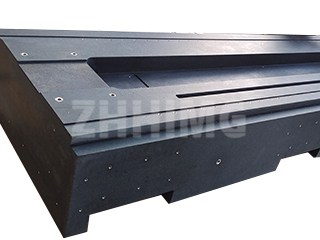When it comes to precision measurement and ultra-high accuracy applications, the choice of material for a granite platform plays a crucial role. Both natural granite and engineered (synthetic) granite are widely used in industrial metrology, but they differ significantly in performance characteristics such as accuracy stability, wear resistance, and long-term reliability.
1. Accuracy and Dimensional Stability
Natural granite is formed over millions of years, giving it inherent structural stability. High-quality black granite, such as ZHHIMG® Black Granite, features a dense crystalline structure and a density of approximately 3100 kg/m³, ensuring excellent flatness retention and minimal thermal expansion. Engineered granite, produced by combining natural aggregates with resins or other binding materials, can offer good flatness initially but may be more sensitive to long-term dimensional changes under varying temperature and humidity conditions. For applications demanding nanometer-level flatness, natural granite remains the preferred choice.
2. Wear Resistance and Surface Durability
Natural granite exhibits superior hardness and abrasion resistance compared to most engineered alternatives. This makes it ideal for precision surface plates, measuring bases, and industrial metrology tools that endure repeated contact with measuring instruments or heavy components. Engineered granite, while capable of providing a smooth surface, may experience micro-abrasion faster, especially in high-load environments.
3. Thermal Behavior
Both natural and engineered granite have low coefficients of thermal expansion, but the uniform mineral composition of high-quality natural granite provides more predictable and stable thermal behavior. This stability is critical for CMM machines, precision CNC equipment, and semiconductor inspection platforms, where even minor thermal shifts can affect measurement accuracy.
4. Application Considerations
-
Natural Granite Platforms: Best suited for CMM bases, optical inspection devices, precision surface plates, and high-end industrial metrology applications where stability and longevity are essential.
-
Engineered Granite Platforms: Suitable for medium-precision applications, prototype assemblies, or environments where cost efficiency is more important than absolute stability.
Conclusion
While engineered granite offers certain advantages in terms of production flexibility and initial cost, natural granite remains the gold standard for high-precision applications. Companies that prioritize accuracy, wear resistance, and long-term stability—such as ZHHIMG®—rely on natural granite to ensure reliable performance across decades of industrial use.
At ZHHIMG®, our proprietary ZHHIMG® Black Granite combines superior density, thermal stability, and surface hardness, providing a trusted foundation for ultra-precision measurement, semiconductor inspection, and advanced manufacturing equipment. Choosing the right granite platform is not just about material—it’s about guaranteeing precision, reliability, and lasting performance.
Post time: Oct-10-2025

